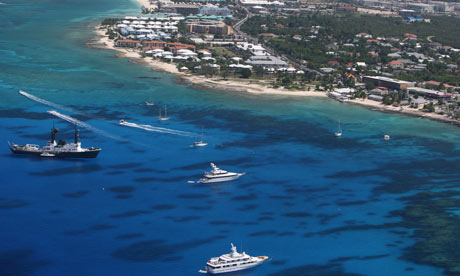Cayman Islands resists taxing demands as it sinks deeper into crisis
• Tax haven holds budget as it waits for $30m emergency loan
• Direct taxation would lead to job losses, argue finance leaders
- guardian.co.uk, Friday 25 September 2009 20.13 BST
- Article history
The Cayman Islands leader, William McKeeva Bush, was today forced to postpone his annual budget as the British overseas territory's debt crisis worsens.
The situation prompted financial leaders of the Caribbean territory to launch a blistering attack on the British Foreign & Commonwealth Office (FCO) minister, Chris Bryant, for demanding the tax haven introduces an employee tax to ward off disaster.

George Town in Grand Cayman: the territory is the capital of the world's hedge funds, which held £1.4tn there last year. Photograph: David Rogers/Getty Images
This month, the Guardian revealed the Caribbean tax haven was forced to ask the Foreign Office permission to borrow £278m from banks to repair huge deficits. The FCO refused, advising the island's authorities to impose property or payroll taxes. Talks are continuing over a £30m emergency loan package. If the money does not arrive soon, the island's government admits it will not be able to pay its civil servants.
Anthony Travers, chairman of the Cayman Islands Financial Services Association and its stock exchange, argued: "The move from an indirect to a direct system of taxation is a seismic shift which has not been thought through and which is not justified on the facts."
The territory is the capital of the world's hedge fund industry, which has assets of $2.3tn (£1.4tn) parked in the island according to figures last year, and it is the world's fifth biggest banking centre. Its GDP places it as the world's 12th richest jurisdiction, despite a population of only 51,900.
Despite its huge wealth, the overseas territory is strongly resisting pressure to levy taxes to escape a black hole caused by the cost of a large public infrastructure programme and dwindling licence fees from the financial institutions.
"I have canvassed senior business players in Cayman and they have indicated that at the first sign of a payroll tax they will have to consider their options," said Travers. "I believe this will inevitably lead to job losses and it will affect both the highly paid and more junior members of staff and lead not to a revenue increase, but a decrease."
Travers added that the City of London would be hit by any change. "The FCO's sniping at hedge funds plays right into the hands of EU legislators who are desperately trying to curb the success of the City of London and, in particular, the hedge fund industry. In short, if the FCO attack the Caymans, they damage London."
Cayman Islands leaders are furious the islands and other tax havens have been blamed by G20 world leaders for helping to bring about the financial crisis. But campaigners argue so-called "secrecy jurisdictions" were central to creating financial instability that exacerbated the crash.
Difficulties in the Caymans come at the same time as Switzerland has been taken off the OECD's "grey list" for signing its 12th information-sharing agreement with another country. Switzerland was promoted to the "white list" as G20 world leaders in Pittsburgh vowed to deploy sanctions against countries not complying with OECD tax protocols. There are 22 tax havens on its grey list.

No comments:
Post a Comment